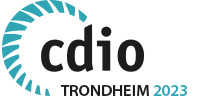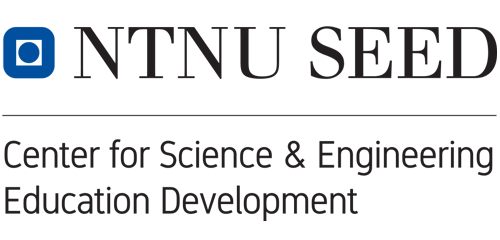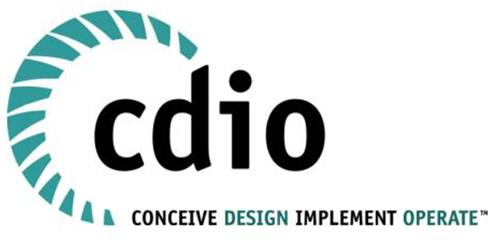Parallel sessions Wednesday
Parallel sessions Wednesday
Subject to changes.
Parallel sessions 3
0900–1030 (30–20–20–20)
Podium 9: Curriculum change and agility
Podium 9: Curriculum change and agility
Room R1
Session chair: Reidar Lyng
0900–0930
Paper: 32
Curriculum Agility as Optional CDIO Standard
Suzanne Brink, Carl Johan Carlsson, Mikael Enelund, Kristina Edström, Elizabeth Keller, Reidar Lyng and Charlie McCartan
0930–0950
Paper: 64
Building up the Relevance in Economics Education and Assessing Its Effect
Yu-Chen Kuo
0950–1010
Paper: 98
Integration of Graduate Employability Skills through Industry Outsourced CDIO Project
Soumya Kanti Manna, Nicola Joyce and Anne Nortcliffe
1010-1030
Paper: 117
Promoting Curriculum Agility through Project-Based Learning: Case of the Australian University (Kuwait)
Hassan Salti, Hania Ghazi El-Kanj, Fadi Alkhatib and Mohammed Abdul-Niby
Podium 10: Labs and spaces for active learning
Podium 10: Labs and spaces for active learning
Room R5
Session chair: Kristina Henricson Briggs
0900–0930
Paper: 216
The Effects of Learning Environments on Student Active Learning
Pasi Aalto, Ole Alsos, Dag Håkon Haneberg, Martin Steinert, Daniel Ege and Ingrid Berg Sivertsen
0930–0950
Paper: 47
The Student Flight Data Recorder – Building a Culture of Learning from Failure
Calvin Rans, Julie Teuwen and Helena Momoko Powis
0950–1010
Paper: 78
Induction Diamond Labs - Giving Everyone an Equal Starting Point
Joanna Bates, Andrew Garrard and Edward Browncross
1010–1030
Paper: 200
Enabling Lifelong Learning by Using Multiple Engagement Tools
Donatella Puglisi and Guillem Domenech-Gil
Podium 11: Self-regulation and inquiry
Podium 11: Self-regulation and inquiry
Room R7
Session chair: Lamjed Bettaib
0900–0930
Paper: 183
Engineering Students' Self-regulation Competencies - the Relationship between Perceptions and Summative Scores
Lynn Van den Broeck, Rani Dujardin and Shandris Tuyaerts
0930–0950
Paper: 112
Python in a Week – Conceptual Tests for Learning and Course Development
Christopher Blocker, Thomas Mejtoft and Nina Norgren
0950–1010
Paper: 163
A Challenge Based Learning Community for Hydrogen Development and Application
Hans Gelten, Benno Aalderink, Richard van Leeuwen, Mirte Disberg-van Geloven, Stephan Corporaal and Yashar Hajimolana
1010–1030
Paper: 17
Inquiry, the Scientific Tool for All Instructional Methodologies
Masoodhu Banu N.M, Padmanabha Sarma A and Deepa Thiyam
Podium 12: Projects and learning outcomes
Podium 12: Projects and learning outcomes
Room R9
Session chair: Nicoleta Maynard
0900–0930
Paper: 89
Correlation Study between the Performance in Different Engineering Courses and Project-based Courses
Sandra Bermejo, Ramon Bragos, Francesc Rey and Josep Pegueroles
0930–0950
Paper: 27
Embedding the Social Sciences in Engineering Education: Collaboration with a Politics Degree
Susan Kenyon
0950–1010
Paper: 65
VUCA and Resilience in Engineering Education – Lessons Learned
Siegfried Rouvrais, Ann-Kristin Winkens, Carmen Leicht-Scholten, Haraldur Audunsson and Cecile Gerwel Proches
1010–1030
Paper: 100
Facilitating Staff Implementation of Teamwork Measurement for Engineering-related Project-based Modules
Joo Ghee Lim, Kwee Teck Tan, Safura Anwar and Ser Khoon Toh
Tutorial: Introduction to CDIO Part 2
Tutorial: Introduction to CDIO Part 2
0900–1030
Introduction to CDIO, Part 2
Juha Kontio and Matt Murphy
Workshop: Spatial Skills
Workshop: Spatial Skills
0900–1030
Paper: 44
Exploring Spatial Skills in Engineering Education
Meryn McNea, Reena Cole, David Tanner and Diarmaid Lane
Roundtable: Hybrid Teaching
Roundtable: Hybrid Teaching
0900–1000
Paper: 204
Hybrid-mode Teaching: Possibilities and Challenges
Dzamila Bienkowska
Roundtable: (Pop-up Roundtable)
Roundtable: (Pop-up Roundtable)
0900–1000
Experience Engineering Reflective Writing
Marcel Kyas, Joseph Timothy Foley, and Markéta Foley
School of Technology, Reykjavík University, Reykjavík, Iceland
Parallell sessions 4
1100–1200 ( 30–15–15 / 30–30)
Podium 13: Digital support for hands-on learning
Podium 13: Digital support for hands-on learning
Room R1
Session chair: Johan Malmqvist
1100–1130
Paper: 118
Online and Blended Labs for Practical Mechanical Engineering
Christian Stöhr, Veronica Olesen, Shahram Sheikhi, Robert Langer, Vladimir Kuts, Margus Müür, Antti Nousiainen, Ari Putkonen, Sakari Koivunen, Yihua Zhang, Jens Kabo, Mikael Enelund and Johan Malmqvist
1130–1145
Paper: 70
HANDZONe: Towards a Hybrid Learning Space for Hands-on Learning Activities
Serdar Asut
1145–1200
Paper: 156
Teaching Reform Practice of "Nursing Practice" System Based on CDIO
Xiang Li, Mingbao Zhang, Xiaoyan Luan, Dongyang Chu and ruiyi Chu
Podium 14: Life-long learning
Podium 14: Life-long learning
Room R5
Session chair: Guri Korpås
1100–1130
Paper: 139
Motivation for Continuous Software Engineering Expertise Development through Lifelong Learning
Anne-Maarit Majanoja, Antti Hakkala, Seppo Virtanen and Ville Leppänen
1130–1200
Paper: 181
Lifelong Learning as Explicit Part of Engineering Programmes: A Case Study
Rani Dujardin, Lynn Van den Broeck, Sofie Craps, Greet Langie, Una Beagon, Caitriona De Paor and Aimee Byrne
Podium 15: Active learning and professional development
Podium 15: Active learning and professional development
Room R7
Session chair: Helene Leong
1100–1130
Paper: 212
Constructivist Principles as Used for Enhancing Active Learning – Case: Engineering Thermodynamics
Nader Ghareeb, Martin Jaeger, Perry R. Hessenauer and Desmond Adair
1130–1145
Paper: 86
An Introductory Reverse Engineering Project to Enhance Teaching Staff and Student Competence
Ahmed Tamkin Butt and Xzara C. Foster
1145–1200
Paper: 51
Advancing CDIO Competencies for Technicians – a Professional Development Framework
Mark Nivan Singh, Sin Moh Cheah and Helene Leong
Roundtable: Engineering Design Process
Roundtable: Engineering Design Process
1100–1200
Paper: 169
How to Teach And/or Learn the Engineering Design Process.
Daniel Spooner and François Rivest
Roundtable: Curriculum Agility
Roundtable: Curriculum Agility
1100–1200
Paper: 206
Examples of Practices Supporting and Illustrating Responsive Curriculum Agility
Reidar Lyng and Anne Nortcliffe
Roundtable: Engineering Identity, Textiles
Roundtable: Engineering Identity, Textiles
1100–1200
Paper: 111
Changing the Fabric of Engineering Identity through Textile Fabrication
Veronica Halupka, Kathy Petkoff and Scott Wordley
Workshop: Extracurricular learning
Workshop: Extracurricular learning
1100–1200
Paper: 121
Enabling Learning and Competence Development of Students in Extracurricular Environments
Ana M. Valencia, Chantal Brans, Isabelle Reymen, Eugenio Bravo Cordova, Bart Koppelmans and Jan van der Veen
Roundtable: (Pop-up Roundtable)
Roundtable: (Pop-up Roundtable)
1100–1200
SUPER Assessor –
A Game developed for integration of sustainability in learning design
Ole Andreas Alsos, Ingrid Berg Sivertsen, Dag Håkon Haneberg, and Åshild Wilhelmsen
Parallel sessions 5
1430–1600 (30–20–20–29)
Podium 16: Study program design and evaluation
Podium 16: Study program design and evaluation
Room R1
Session chair: Paul Hermon
1430–1500
Paper: 3
Education as Complex System: Need for More Forward-looking CDIO Program Evaluation
Sin Moh Cheah
1500–1520
Paper: 40
CDIO and Competency-based Learning Approaches Applied Together to Military Engineering Education
Andre Luiz Tenorio Rezende, Carlos Frederico de Matos Chagas, Gustavo Simao Rodrigues and Suzana Marly da Costa Magalhaes
1520–1540
Paper: 130
Creating and Deploying an Electronic Engineering Master Program Based on CDIO Framework
Binh Dac Ha and Truong Van Truong
1540–1600
Paper: 101
Case Studies of Integrating Project Based Learning into Polytechnic Engineering Curriculum
Eunice Goh, Siew Wee Kwek, Wei Sin Ang, Kent Loo, Hengky Chang, Chi Mun Cheah, Ying Li and Eunice Chia
Podium 17: Faculty development
Podium 17: Faculty development
Room R5
Session chair: Suzanne Brink
1430–1500
Paper: 29
Teaching Engineering as a Design Science
Remon Rooij and Linette Bossen
1500–1520
Paper: 58
Development of Meaningful Lesson Using LXD Methodology for an Engineering Module
Meijun Zhao, Edwin Foo, Flex Tio and Siew Wee Kwek
1520–1540
Paper: 179
Teaching Competency Development Framework for SRMIST Faculty Members
Rajeev Sukumaran and Vairavel Gurusamy
1540–1600
Paper: 191
Experiences from Implementing a Scholarship of Teaching and Learning Program for Teachers
Hanne Loeje
Podium 18: Sustainability in courses
Podium 18: Sustainability in courses
Room R7
Session chair: Ulrika Lindqvist
1430–1500
Paper: 123
Student-centered Learning Activities for Key Sustainability Competencies in Online Courses with Many Students
Johan Berg Pettersen and Ulrika Lundqvist
1500–1520
Paper: 8
A Framework for a Sustainability Transition of Two Engineering Master's Courses
Anders Adlemo
1520–1540
Paper: 9
Is My Master Thesis Research Project Sustainable? Including Sustainability in "Research Methodologies"
Ines Uriol Balbin
1540–1600
Paper: 120
Sustainable Aircraft Design in Engineering Education: Conceive, Design, Implement, and Operate Virtually
Alexander Somerville, Luke Pollock, Keith Joiner, Timothy Lynar and Graham Wild
Podium 19: Projects and progression
Podium 19: Projects and progression
Room R9
Session chair: Erik Hulthén
1430–1500
Paper: 13
The Nature of Progression between Yearly Project Courses
Camilla Björn, Kristina Edström, Liv Gingnell, Joakim Lilliesköld and Marie Magnell
1500–1520
Paper: 52
Project Seminar – Reconstructing the Capstone Project Process
Liviu Gal, Gabriela Dorfman Furman and Zeev Weissman
1520–1540
Paper: 97
Adapting Entrepreneurship Techniques for Creative Technical Course Design
Emily Marasco and Laleh Behjat
1540–1600
Paper: 137
Practice-based Engineering Design for Next-Generation of Engineers: A CDIO-based Approach
Salman Saeidlou, Nikdokht Ghadiminia, Anne Nortcliffe and Stuart Lambert
Roundtable: Emotions
Roundtable: Emotions
1430–1600
Paper: 176
Why Should CDIO-programs and Educators Care about Emotions?
Johanna Lönngren and Roland Tormey
Roundtable: Gamification
Roundtable: Gamification
1430–1530
Paper: 53
Games and Gamification in CDIO
Marcus Vinicius Pereira Pessoa, Klaasjan Visscher, Guido Bruinsma and Verena Schulze Greiving
Workshop: Mathematics for STEM
Workshop: Mathematics for STEM
1430–1600
Paper: 76
Interdisciplinary Collaboration to Make Mathematics Relevant and Engaging for STEM Students
Ernest Ampadu, Salim Mohamed Salim, Hanne Deprez and Elizabeth Keller
Roundtable: (Pop-up Roundtable)
Roundtable: (Pop-up Roundtable)
1430–1530



